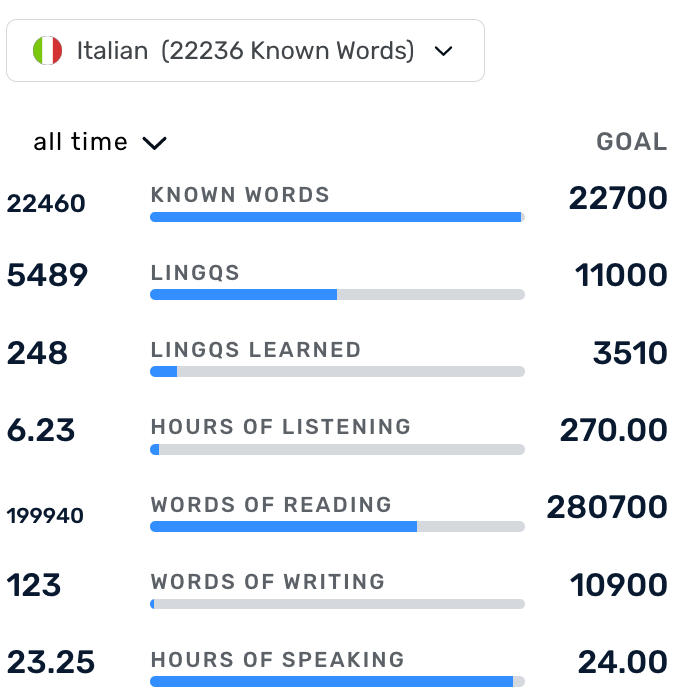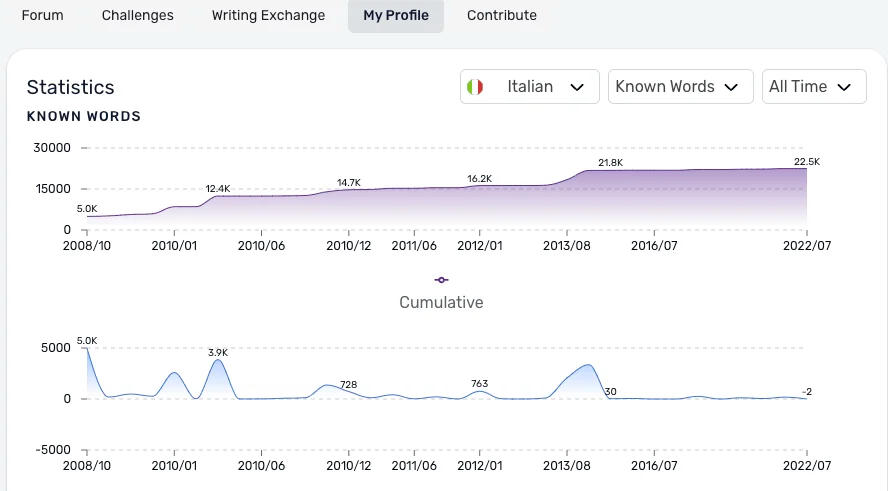Italian is a language that has always appealed to me, as Italy is such a lovely country. I have traveled and hitchhiked through Italy and, at that time, I didn’t speak Italian, so I was relying on my knowledge of Spanish to communicate with people. With so many fascinating places to visit, great food and lively people, it didn’t take long to realize that I wanted to learn Italian.
I’ve compiled some Italian resources which helped me learn the language. I’ll also share my methods for learning Italian then, the best way to learn Italian now, and where I am today with the language.
How I Started Learning Italian
The first thing I remember doing was getting the Italian Linguaphone series. It’s basically an at-home course to help you learn Italian. I find the courses overpriced, as you only really need the text, audio and a glossary. Furthermore, I’ve always found that the comprehension exercises unnecessary, as they spoil the pleasure of reading.
When reading and listening to a language, the goal is not perfect comprehension. The purpose is consistency and enjoyment. So, I skipped all of the practice exercises, but I did read the text and listen to the audio many times. This was about 30 years ago. I instinctively embraced repetition, listening and reading things several times to absorb the vocabulary.
I have never liked bilingual books where you have, for example, Italian on the left-hand side and English on the right-hand side. This has never been an effective learning strategy for me. I don’t want to have to skim through the English text until I find the corresponding word from the Italian text.
When studying a language, I just want to quickly look up the word that I don’t know and move on. Back then, this required using a reader with a glossary. There were many different books that I read, for example Prime Letture Italiane Per Stranieri by Armida Roncari. There are, however, a few disadvantages with glossaries. For example, the word that you’re looking for may not be in the glossary. Today, these types of readers have been, to a large extent, made obsolete by online dictionaries and tools like LingQ.
Freebie Italian
Obviously, if you speak French or Spanish, you get a lot of “freebie” vocabulary in Italian due to the similarities between the languages.
People often make a big fuss about “false friends,” or words that appear to have the same meaning across both languages, but actually do not. False friends aren’t actually such a big deal. Sure, there is the odd false friend among these languages, and you may use the word in the wrong context, but through these mistakes, you’ll quickly make the corrections. The bottom line is that the common vocabulary is a much greater benefit to the learner than it is an obstacle.
Italian Grammar
I used a great Italian grammar book called Essential Italian Grammar by Olga Ragusa, which I go back to often. This is a great resource because the different Italian pronouns can be quite difficult, as they’re different from what I’m used to with other languages. I found it beneficial to review the rules and then watch for them when reading and listening to my Italian content.
Italian Audiobooks

A big boost to my Italian was the discovery of Il Narratore, a very small audiobook publisher based up on a hillside near Verona. He has a number of wonderful Italian audiobooks, and a particularly great rendering of I Promessi Sposi, a classic of Italian literature. This novel was often read in school, so a lot of people, particularly Italian people, find the story quite boring. For me, I love that it takes place in another century, in another country, it feels exotic. It’s the type of story that I like and this is a really lovely audiobook version that he does. I can remember jogging in Palm Springs listening to I Promessi Sposi.
Il Narratore also has a fantastic audiobook version of Pinocchio. The great thing about classics like these is that you can easily find the digital text online and import it into LingQ. You can then look up words and phrases and listen to the audio. This allows you to learn in a way that’s much easier than struggling through bilingual textbooks or even books with glossaries.
The Best Way to Learn Italian: LingQ
If I could learn Italian all over again, I’d do it with LingQ. LingQ is a reading platform for language learners, and it removes barriers between you and reading in your target language. For example, I want to read Umberto Eco novels, but there are too many words that I don’t understand. If I read a paper copy, I end up underlining many words with the optimistic intention of coming back to them and looking them up with a dictionary, which I never do. With LingQ, however, I’m able to instantly translate and save new vocabulary for later review. With just one click, I’m able to enhance my comprehension, tackle more challenging texts, and review more effectively.
I’ll show you how I’ve studied Italian recently on LingQ. If I click on my profile and look at my activity, you can see that I have 22,236 known words, and that I was particularly active back in 2008. I’ve revisited the language a bit more sporadically since then.
If I look at my LingQs created, I can see that there are only 5,000 of them. This tells me that the bulk of my known words came from words that I saw in the text, but didn’t have to look up. Why is this useful information? Well, LingQ determines your vocabulary level as you read, allowing you to more accurately gauge the difficulty of texts, your rate of progress, etc.
If I look at the amount words I’ve read, I can see that I’ve read a fair number. I’ve also read a lot of blogs, articles, transcripts, etc., and I’m able to visualize my learning habits using LingQ. Back in 2013, for example, I read 61,000 words, which isn’t insignificant.
So looking back at the gradual growth of my known words total, it picked up a lot at the beginning and then gradually grew, but I haven’t been very active in recent years.
Where do I Want to Get to with my Italian?
I can communicate in Italian, but not as well as I would like. While I understand well, if I pick up an Italian book, there are words that I don’t know. I would like to be better in my reading, and if I weren’t learning Arabic and Persian, I would love to spend time improving my Italian, as with many other languages.
I have brought my Italian up to a level where it isn’t semi-Spanish. It’s actually Italian, but it’s not as good as I would like. However, with LingQ, I could improve my Italian significantly before a trip to Italy or an interview in Italian. I would say I’m at a rusty B2, which I could surely solidify or even bring up to a C1. Overall, Italian is a fantastic language. I very much enjoy learning it, and I hope you do too. Happy learning!





